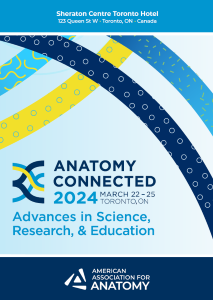Anatomy Education: Teaching Methods & Innovations Posters
Poster: Anatomy Education: Teaching Methods & Innovations Posters
155 - Development of an “Anatomy Bootcamp” to prepare medical students for remediation of Medical Anatomy
Saturday, March 23, 2024
5:00pm - 7:00pm US EDT
Location: Sheraton Hall
Poster Board Number: 155
There are separate poster presentation times for odd and even posters.
Odd poster #s – first hour
Even poster #s – second hour
Co-authors:
There are separate poster presentation times for odd and even posters.
Odd poster #s – first hour
Even poster #s – second hour
Co-authors:
-

Lydia E. Strattan, PhD
Assistant Professor
University of Pittsburgh
Pittsburgh, Pennsylvania, United States
Presenting Author(s)
Abstract Body : Introduction & Objective: Many medical schools across the United States are undergoing curriculum reform1 to address issues of student attendance and engagement, diversity of learning styles, clinical relevance, and incorporation of new technologies. In the fall of 2023, the University of Pittsburgh School of Medicine launched the Three Rivers Curriculum (3RC), which excludes lectures and instead focuses on case-based learning in small groups. The 3RC also abridges the pre-clerkship period from 2 years to 1.5 years, prompting basic science educators to reduce the volume of material they teach and integrate it throughout the curriculum. One course that remains isolated from case-based education is Medical Anatomy. Medical Anatomy was shortened from 7 weeks to 3 weeks but remains as a stand-alone, dissection-based course which students must pass based on a single summative exam grade. In the first year of the 3RC, 7 first-year medical students did not pass the summative assessment and were required to remediate by reaching a passing threshold on a different cumulative exam. To explore why students struggled in the initial course and to aid their preparation for remediation, an “Anatomy Bootcamp” was developed. This brief, optional course focused on active learning through serious games, a method that has been used extensively in medical education2 to keep students engaged with material and improve learning outcomes.
Methods: Throughout 3 days, six students played games designed to review and test their knowledge of the subjects from Medical Anatomy. Topics for Bootcamp games were chosen after a review of the summative exam that determined the content areas of items that were most frequently missed by remediating students. Following the Bootcamp, students were sent a questionnaire to gather data about the experience before sitting for the remediation exam.
Conclusion & Significance: All students passed the remediation exam on the first attempt and reported that Bootcamp activities enhanced their understanding of material, increased their confidence in applying anatomy knowledge to clinical vignette questions, and helped anatomy content “stick” in a way that they can remember it. Questionnaire data demonstrates that incorporating these activities into the Medical Anatomy course could aid learning and retention, potentially decreasing the need for remediation.
1 LCME Annual Medical School Questionnaire Part II, 2017-2018
2 Olszewski,& Wolbrink. Serious Gaming in Medical Education: A Proposed Structured Framework for Game Development. Simulation in Healthcare: The Journal of the Society for Simulation in Healthcare. 2017.
Methods: Throughout 3 days, six students played games designed to review and test their knowledge of the subjects from Medical Anatomy. Topics for Bootcamp games were chosen after a review of the summative exam that determined the content areas of items that were most frequently missed by remediating students. Following the Bootcamp, students were sent a questionnaire to gather data about the experience before sitting for the remediation exam.
Conclusion & Significance: All students passed the remediation exam on the first attempt and reported that Bootcamp activities enhanced their understanding of material, increased their confidence in applying anatomy knowledge to clinical vignette questions, and helped anatomy content “stick” in a way that they can remember it. Questionnaire data demonstrates that incorporating these activities into the Medical Anatomy course could aid learning and retention, potentially decreasing the need for remediation.
1 LCME Annual Medical School Questionnaire Part II, 2017-2018
2 Olszewski,& Wolbrink. Serious Gaming in Medical Education: A Proposed Structured Framework for Game Development. Simulation in Healthcare: The Journal of the Society for Simulation in Healthcare. 2017.

